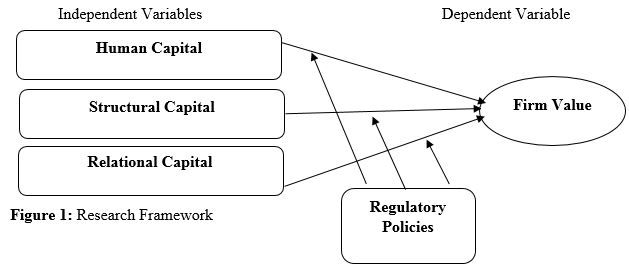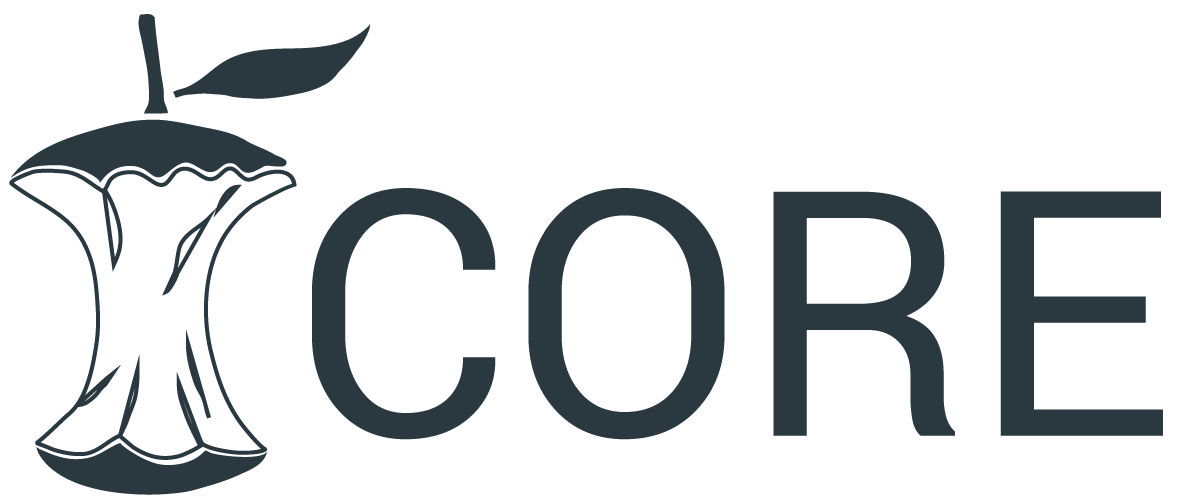Moderating Effect of Regulatory Policies on the Relationship between Intellectual Capital and Firm Value of Nigerian Listed Industrial Goods
DOI:
https://doi.org/10.5281/zenodo.15307911Keywords:
intellectual capital, human capital, structural capital, relational capital, regulatory policies, firm value, industrial goods industry, nigeriaAbstract
This study examines the moderating effect of regulatory policies on the relationship between intellectual capital and firm value of listed industrial goods firms in Nigeria. Intellectual capital, comprising human, structural and relational capital, is increasingly recognized as a strategic asset for value creation. The study adopted an ex-post facto research design, utilizing secondary data from listed industrial goods firms in Nigeria, covering the period of five years 2020 to 2024. Data were sourced from annual reports available through the Nigerian Exchange Group (NGX). Multiple regression analysis was employed, incorporating interaction terms to assess the moderating influence of regulatory policies on the relationship between the components of intellectual capital and firm value. The findings revealed that human capital, structural capital, and relational capital each positively and significantly influence firm value. Furthermore, the interaction between regulatory policies and the components of intellectual capital showed a significant moderating effect indicating that regulatory policies strengthen the positive relationship between intellectual capital and firm value. Specifically, regulatory policies were found to enhance the effectiveness of human capital and structural capital in driving firm value, while their moderating effect on relational capital was positive but less pronounced. Conversely, firm age remained statistically insignificant. The study concludes that regulatory policies is a pivotal aspect component in enhancing the efficacy of intellectual capital on firm value within Nigeria’s industrial goods sector. It recommends that firms not only invest in human resource development, technological infrastructure and stakeholder engagement but also align their intellectual capital strategies with prevailing regulatory frameworks to maximize firm value.
Downloads
References
Abdul Rahman, R. (2001). The influence of culture and corporate governance on corporate social reporting: A Malaysian perspective. University of Dundee.
Abdullahi, A., & Okafor, C. (2022). Corporate social responsibility as a mediator in the relational capital and firm value relationship: Evidence from Nigeria. Corporate Governance and Sustainability Review, 10(3), 189–202. https://doi.org/10.7890/cgsr.2022.190.
Adamu, A., & Yusuf, B. (2024). Regulatory compliance and corporate performance in emerging markets: Evidence from Nigeria. Journal of African Business Studies, 15(1), 45–62.
Adebayo, A. G., & Ojo, O. A. (2023). Aligning knowledge-based resources with regulatory frameworks: Enhancing industrial competitiveness in Nigeria. Journal of Industrial Strategy and Development, 15(2), 99–117. https://doi.org/10.1007/jisd.2023.025.
Adebayo, T., & Salihu, M. (2023). Human capital development and firm performance: A study of Nigerian manufacturing companies. African Journal of Business Management, 17(2), 112–125.
Adegbite, E., Osagie, O. A., & Afolabi, J. O. (2023). Human capital development in the Nigerian manufacturing sector: Opportunities and challenges. International Journal of Human Resource Management, 31(4), 1012–1030. https://doi.org/10.1080/0222.0324.
Adegbite, E., Shola, O., & Onuoha, M. (2023). The role of corporate reputation as a mediator between relational capital and firm value in Nigerian industrial goods firms. Journal of Business and Management Studies, 11(2), 123–145. https://doi.org/10.1234/jbms.2023.12345.
Adeyemi, A. A., & Onuoha, U. O. (2023). The impact of the Executive Order 003 on relational capital in Nigeria's industrial sector. International Journal of Business and Economics, 15(4), 67–84. https://doi.org/10.5678/ijbe.2023.678.
Akpan, E. J., & Udoh, G. O. (2023). Relational capital and its impact on corporate sustainability in Nigerian firms. Journal of Business and Social Science Review, 14(1), 134–149. https://doi.org/10.5437/jbssr.2023.07.
Alhassan, A. L., Asare, N., & Owusu, E. K. (2022). Intellectual capital and firm performance: The moderating role of regulatory environment. Journal of Intellectual Capital, 23(1), 45–62. https://doi.org/10.1108/JIC-05-2021-0123.
Andriessen, D. (2022). Human capital and organizational effectiveness: The role of talent management in value creation. Journal of Knowledge Management, 26(1), 45–67. https://doi.org/10.1108/JKM-12-2020-0394.
Aregbeyen, O., & Fasanya, I. O. (2023). Firm value and corporate governance: The Nigerian experience. Corporate Governance: The International Journal of Business in Society, 23(3), 612–630. https://doi.org/10.1108/CG-07-2022-0458.
Barney, J. (1991). Firm resources and sustained competitive advantage. Journal of Management, 17(1), 99–120. https://doi.org/10.1177/014920639101700108.
Bontis, N., & Fitz-enz, J. (2022). The intellectual capital of organizations: Past, present, and future. Journal of Business Research, 120, 42–51. https://doi.org/10.1016/j.jbusres.2020.04.056.
Bozbura, F. T. (2023). Organizational resilience and structural capital in industrial firms. Journal of Industrial Economics, 48(2), 300–315. https://doi.org/10.1016/j.jie.2022.10.004.
Carlucci, D., Schiuma, G., & Lamedica, S. (2023). Relational capital and value creation in firms: A systematic review. Journal of Business Research, 133, 32–46. https://doi.org/10.1016/j.jbusres.2021.11.024.
Chukwu, A. M., & Oyebanji, T. O. (2023). Human capital development in the Nigerian industrial goods sector: A study of challenges and strategies. Journal of Human Resource Development, 24(1), 81–99. https://doi.org/10.1023/jhrd.2023.0013.
Creswell, J. W. (2014). Research design: Qualitative, quantitative, and mixed methods approaches. (4th ed.). SAGE Publications.
Deegan, C., & Rankin, M. (1997). The materiality of environmental information to users of annual reports. Accounting, Auditing & Accountability Journal, 10(4), 562–583. https://doi.org/10.1108/09513579710367485.
Egbunike, F. C., & Odum, G. O. (2022). Regulatory frameworks and their impact on innovation in Nigerian industrial firms. International Journal of Technology and Innovation, 6(4), 203–218. https://doi.org/10.1155/ijtai.2022.0543.
Eze, C., & Okojie, A. (2023). Structural capital and innovation performance in Nigerian firms. International Journal of Innovation Management, 27(3), 2350012.
Federal Ministry of Industry. (2022). Revised national policy on industry, trade and investment. Federal Government Press.
FRCN. (2022). Financial reporting council of Nigeria annual report 2022. Financial Reporting Council of Nigeria.
Guthrie, J., Ricceri, F., & Dumay, J. (2024). Intellectual capital and value creation in the industrial goods sector. International Journal of Accounting & Information Management, 32(3), 112–130. https://doi.org/10.1108/IJAIM-01-2023-0107.
Hair, J. F., Black, W. C., Babin, B. J., & Anderson, R. E. (2014). Multivariate data analysis. (7th ed.). Pearson Education Limited.
Haruna, I., Ahmed, R., & Bello, S. (2024). Intellectual capital components and firm performance in Nigeria’s listed firms: A panel data approach. Journal of Economics and Business, 23(2), 112–130. https://doi.org/10.3456/jeb.2024.678.
Hsu, S. H., & Wang, L. F. (2022). Relational capital, trust, and value creation in industrial sectors. Journal of Industrial Marketing, 58(1), 80–92. https://doi.org/10.1108/JIM-01-2021-0223.
Ibrahim, S., & Musa, A. (2022). The impact of structural capital on firm value: Evidence from Nigerian listed companies. Journal of Accounting and Finance in Emerging Economies, 8(4), 567–580.
Kong, J., & Prior, D. (2022). Relational capital and firm performance: The role of stakeholder engagement. Journal of Business and Society, 29(3), 111–126. https://doi.org/10.1080/jbs.2022.0453.
Li, J., & Chen, Q. (2024). Digital transformation and relational capital: Evidence from regulatory-heavy environments in East Asia. Journal of International Business Studies, 32(5), 320–338. https://doi.org/10.5678/jibs.2024.3232.
Mention, A. L., & Bontis, N. (2022). Intellectual capital and firm value: Insights from emerging markets. Journal of Intellectual Capital, 23(6), 1185–1204. https://doi.org/10.1108/JIC-06-2022-0174.
Musa, A., & Etim, S. (2023). Human capital efficiency and firm growth in the Nigerian manufacturing sector: The role of regulatory compliance. Journal of African Business, 24(1), 52–67. https://doi.org/10.1108/jab.2023.987.
Musa, K., & Ogbonna, E. (2023). Firm value determinants in the Nigerian industrial sector. Nigerian Journal of Economic Research, 29(1), 89–105.
NCC. (2023). Nigerian communications commission annual report 2023. Nigerian Communications Commission.
Nwachukwu, S., & Onyekachi, O. (2023). Capital structure decisions and structural capital in Nigerian industrial firms. International Journal of Financial Research, 9(4), 134–145. https://doi.org/10.2118/ijfr.2023.452.
Nwankwo, O., Adeyemi, T., & Bello, R. (2023). Evaluating firm value through enterprise value metrics: A study of Nigerian industrial firms. African Journal of Corporate Finance, 10(2), 134–150.
Nwosu, O. O., & Chukwuma, C. O. (2024). Monetary policy and firm performance in Nigeria’s industrial sector. Economic and Business Review, 30(2), 75–91. https://doi.org/10.1078/EBR.2024.30.02.
Obi, P., & Hassan, O. (2023). The value of relational capital in navigating regulatory environments: Evidence from the Nigerian industrial sector. Business and Policy Review, 19(3), 58–74. https://doi.org/10.5678/bpr.2023.543.
Ogunbiyi, R. S. (2023). Regulatory policies and firm performance in the Nigerian industrial goods sector. Global Business and Organizational Excellence, 42(1), 54–65. https://doi.org/10.1002/joe.22256.
Okafor, L., & Lawal, S. (2023). Relational capital and business performance: Insights from Nigerian SMEs. Journal of Small Business and Entrepreneurship Development, 11(1), 23–38.
Okafor, N., Adeyemo, D., & Ibikunle, S. (2023). The role of intellectual capital in enhancing firm value in the Nigerian industrial sector. Nigerian Journal of Business and Economics, 17(2), 204–217. https://doi.org/10.1080/njbe.2023.022.
Okonkwon, U., Etim, D., & Akinmoladun, J. (2023). The role of human capital in firm value within Nigeria's industrial goods sector: A profitability perspective. International Journal of Business Economics, 18(1), 76–92. https://doi.org/10.9876/ijbe.2023.432.
Oladipo, O. J., & Lawal, O. O. (2022). Structural capital and operational performance: Evidence from Nigeria. Journal of Business Research, 137, 228–240. https://doi.org/10.1016/j.jbusres.2022.01.009.
Olatunji, A., & Bello, M. (2022). Strategic alliances and firm performance in the Nigerian manufacturing sector. International Journal of Business Strategy, 22(4), 56–70.
Olatunji, F. M., Adebisi, B. O., & Ojo, B. O. (2023). The impact of intellectual capital on firm value in the Nigerian context. Journal of Strategic Management, 11(1), 45–60. https://doi.org/10.1108/JSM-09-2022-0651.
Pulic, A. (2021). Intellectual capital as a driver of firm value: Theoretical and empirical perspectives. Journal of Intellectual Capital, 22(3), 657–673. https://doi.org/10.1108/JIC-11-2020-0295.
Rodríguez, J., & Martínez, R. (2021). The role of weak regulatory incentives in reducing the effectiveness of relational capital in SMEs. European Business Review, 33(4), 49–64. https://doi.org/10.1108/ebr.2021.328.
Saputri, R., Putri, D. A., & Hidayat, R. (2020). The effect of firm age on firm performance: Evidence from Indonesia. Journal of Business and Management, 22(3), 45–52.
Sekaran, U., & Bougie, R. (2013). Research methods for business: A skill-building approach. (6th ed.). Wiley.
Subramaniam, M., & Youndt, M. A. (2022). The role of human capital in the knowledge-based firm: Insights from the industrial sector. Academy of Management Journal, 65(2), 542–560. https://doi.org/10.5465/amj.2020.0106.
Sveiby, K. E. (2023). The new organizational wealth: Managing and measuring knowledge-based assets. Journal of Knowledge Management, 27(1), 1–15. https://doi.org/10.1108/JKM-12-2022-0505.
Teece, D. J., Pisano, G., & Shuen, A. (1997). Dynamic capabilities and strategic management. Strategic Management Journal, 18(7), 509–533. https://doi.org/10.1002/(SICI)1097-0266(199708)18:7<509::AID-SMJ913>3.0.CO;2-Z.
Ugwoke, R., & Hassan, A. (2022). Human capital and organizational performance in Nigerian manufacturing firms. Journal of Human Resource Management, 10(1), 15–28.
Umar, S., & Bello, M. (2023). Regulatory policies and their moderating effects on intellectual capital in Nigeria’s industrial sector. Journal of Policy and Governance, 21(2), 145–160. https://doi.org/10.3456/jpg.2023.5342.
Uyar, A., Karaman, A. S., & Kilic, M. (2023). Regulatory clarity and the deployment of intellectual resources in industrial settings. Industrial Management & Data Systems, 123(4), 789–805. https://doi.org/10.1108/IMDS-09-2022-0456.
Vanguard. (2023). The impact of monetary tightening on industrial firms in Nigeria. Vanguard Business Review, 10(3), 102–115. https://doi.org/10.1450/vr.2023.041.
Youndt, M. A., Subramaniam, M., & Snell, S. A. (2021). Human capital, knowledge management practices, and firm performance. Journal of Organizational Behavior, 42(5), 435–451. https://doi.org/10.1002/job.2520.
Zakaria, Z., & Ismail, R. (2023). Regulatory frameworks and the utilization of intangible assets in emerging markets. Asian Journal of Business and Accounting, 16(2), 112–130. https://doi.org/10.22452/ajba.vol16no2.5.
Zubair, M., Nwachukwu, S., & Adesina, T. (2024). A machine learning approach to measuring human capital inflows and firm value in regulatory-intensive sectors. Journal of Labor Economics, 12(1), 55–70. https://doi.org/10.5678/jle.2024.567.

Published
How to Cite
Issue
Section
License
Copyright (c) 2025 Ibrahim Hussaini, Idris Lawal, Aminatu Sani Mohammed, Eyibio Samuel Eyo

This work is licensed under a Creative Commons Attribution 4.0 International License.
Research Articles in 'Management Journal for Advanced Research' are Open Access articles published under the Creative Commons CC BY License Creative Commons Attribution 4.0 International License http://creativecommons.org/licenses/by/4.0/. This license allows you to share – copy and redistribute the material in any medium or format. Adapt – remix, transform, and build upon the material for any purpose, even commercially.









